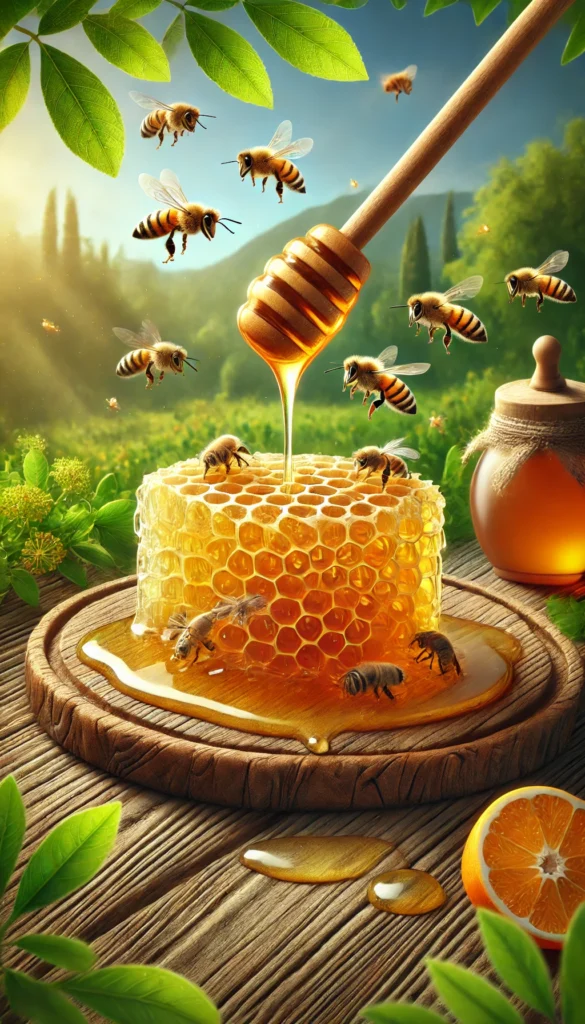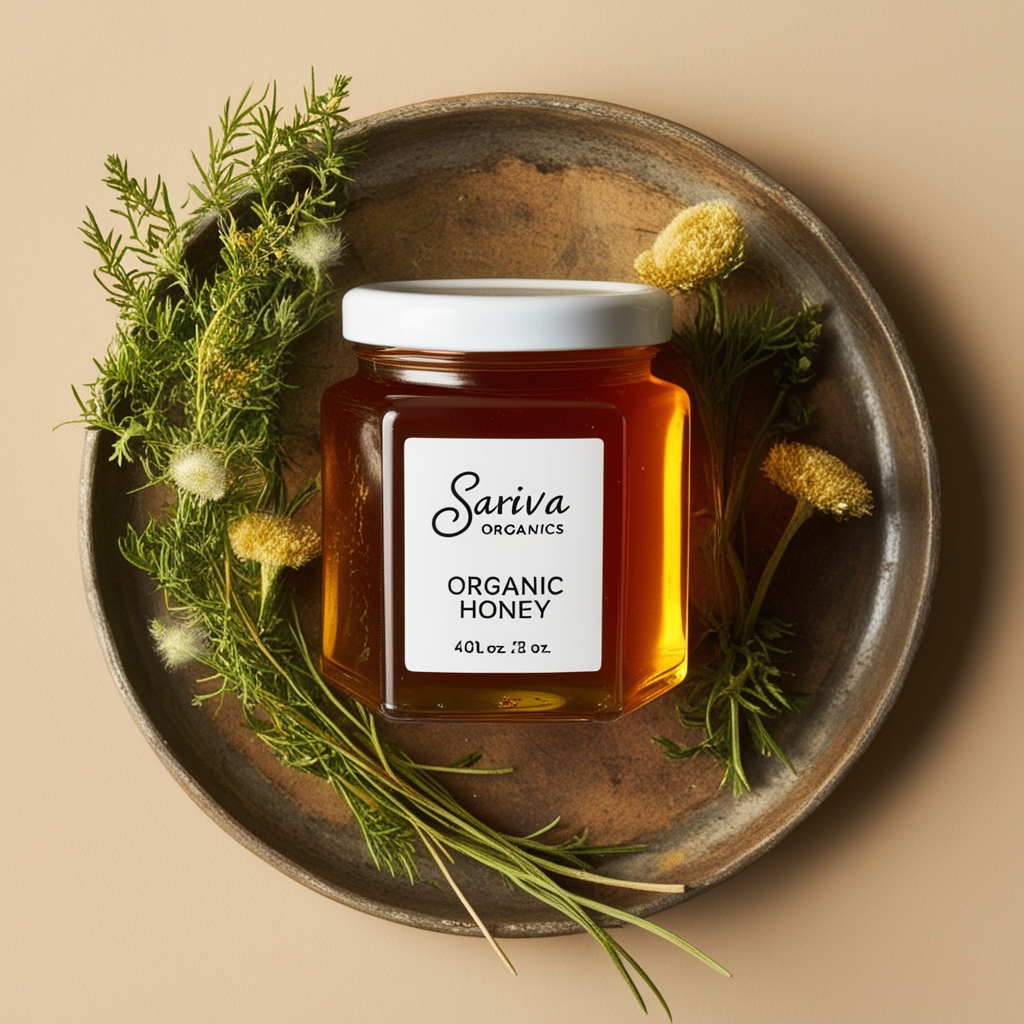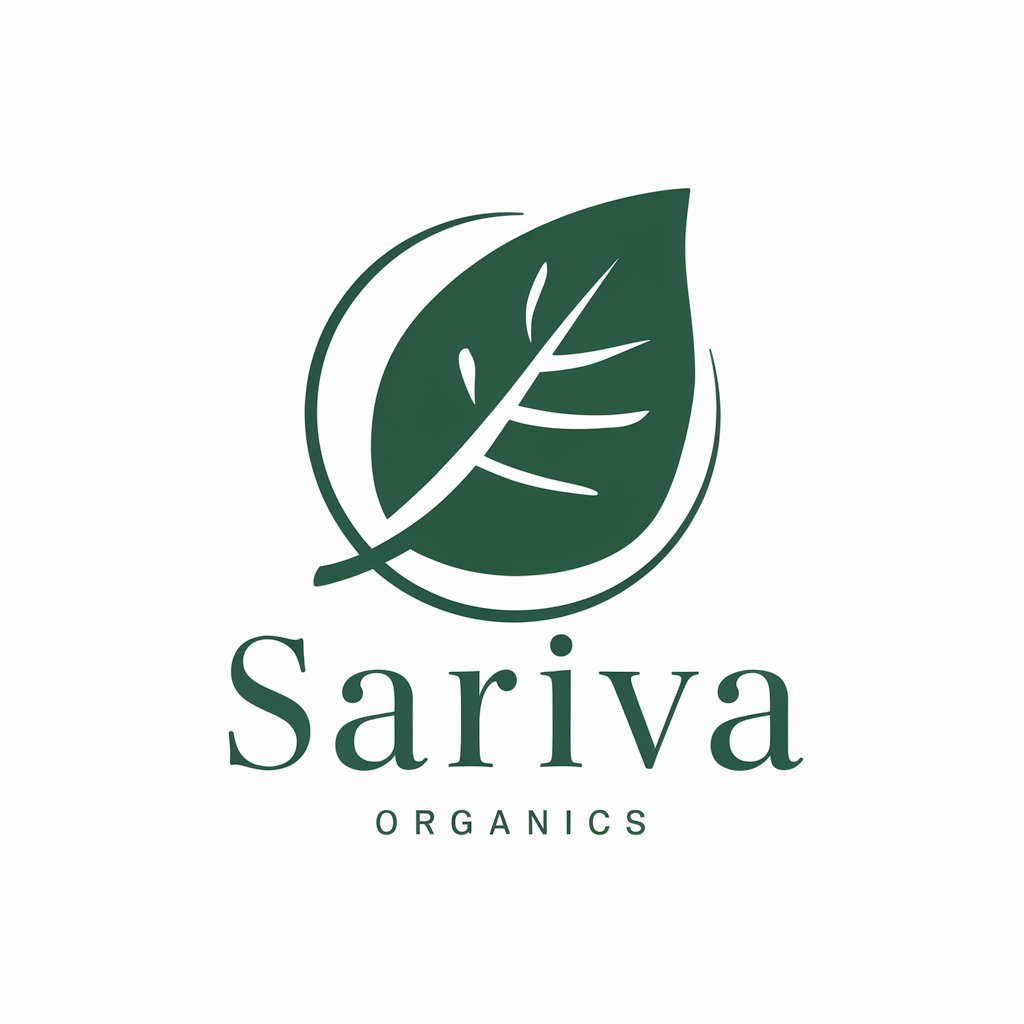I still remember the day I first tasted organic honey. It was during a visit to my friend’s farm in Himachal Pradesh. She handed me a jar of her homemade honey, still warm from the sun, and encouraged me to take a spoonful. The rich, floral sweetness was unlike any honey I had ever tasted before, and I was hooked. It wasn’t just the flavor that fascinated me; it was the story behind it—the care, the purity, and the connection to nature that resonated deeply with my passion for organic farming.
Honey has been cherished since ancient times, used not just as a sweetener but also for its medicinal properties. From the Egyptians using it in embalming rituals to its mention in ancient Indian Ayurveda texts, honey’s versatility and benefits have made it a staple across cultures and eras.
In this blog post, we’ll dive into the world of organic honey. We’ll explore what sets it apart from regular honey, the various types available, and, most importantly, the health benefits that make it such a prized possession in kitchens and medicine cabinets alike. Whether you’re a seasoned honey enthusiast or just beginning to explore its wonders, there’s something here for everyone.
Key Takeaways
- Nutrient-Rich: Organic honey contains natural sugars, vitamins, minerals, antioxidants, and enzymes.
- Health Benefits: Offers antibacterial, antifungal, and anti-inflammatory properties; soothes coughs and sore throats; supports digestive health.
- Sustainable Practices: Produced without synthetic chemicals; supports biodiversity and bee populations.
- Ethical Sourcing: Gathered by traditional honey hunters; no hive damage or bee harm; supports rural employment and ancient practices.
- Genuine and Pure: Delivered in honeycombs; naturally processed without heat or mechanical extraction.
- Versatile Use: Ideal for beverages, cooking, baking, and as a natural sweetener.
Nutritional Profile of Organic Honey

Organic honey is not just a delicious sweetener but also a powerhouse of nutrients that contribute to its status as a superfood.
Macronutrients
Organic honey primarily consists of natural sugars, which provide a quick source of energy. The main sugars found in honey are fructose and glucose. These natural sugars are easily digestible, making honey a great pre-workout snack or an energy booster. In addition to sugars, honey contains trace amounts of protein and fiber. While these amounts are minimal, they still contribute to the overall nutritional value of honey, making it a more balanced sweetener compared to refined sugar.
Micronutrients
Organic honey is rich in a variety of vitamins and minerals, making it a nutritional treasure trove. It contains B-complex vitamins such as B6, thiamine, riboflavin, and niacin, which are essential for energy production and maintaining healthy skin and nerves. Vitamin C, also present in honey, is a powerful antioxidant that supports the immune system and helps in the repair of body tissues.
When it comes to minerals, honey does not disappoint. It provides small but significant amounts of calcium, iron, magnesium, and potassium. Calcium is crucial for bone health, while iron is vital for the production of hemoglobin. Magnesium helps regulate muscle and nerve function, and potassium is essential for maintaining proper heart and muscle function.
Antioxidants and Enzymes
One of the most remarkable aspects of organic honey is its high antioxidant content. Antioxidants are compounds that help neutralize harmful free radicals in the body, protecting cells from damage and reducing the risk of chronic diseases. Organic honey contains a variety of antioxidants, including flavonoids and phenolic acids. These antioxidants are more concentrated in darker honey varieties, such as buckwheat honey.
In addition to antioxidants, honey is also rich in enzymes. These enzymes are added by bees during the honey-making process and include invertase, diastase, and glucose oxidase. These enzymes not only aid in the digestion of honey but also enhance its antibacterial and antimicrobial properties. For instance, glucose oxidase helps produce hydrogen peroxide, which contributes to honey’s ability to heal wounds and fight infections.
In conclusion, the nutritional profile of organic honey makes it a valuable addition to a healthy diet. Its combination of natural sugars, vitamins, minerals, antioxidants, and enzymes provides a multitude of health benefits that go beyond its delightful taste. Whether you’re using it as a sweetener, a natural remedy, or a beauty ingredient, organic honey is a true gift from nature.
Health Benefits of Organic Honey

Organic honey is more than just a natural sweetener; it’s a potent health elixir with a myriad of benefits.
Antibacterial and Antifungal Properties
One of the most well-known benefits of organic honey is its natural antibacterial and antifungal properties. Honey contains hydrogen peroxide, which is produced by the enzyme glucose oxidase. This compound gives honey its ability to kill bacteria and fungi. Additionally, honey’s low pH and high sugar content create an environment that is inhospitable to microbial growth.
Honey’s antibacterial properties make it particularly effective for wound healing and treating skin infections. When applied topically, honey can help clean wounds, prevent infection, and promote faster healing. It is especially useful for treating burns, cuts, and abrasions. Clinical studies have shown that honey can be as effective, if not more so, than conventional treatments for wounds and skin infections due to its antimicrobial properties and its ability to maintain a moist healing environment.
Rich in Antioxidants
Organic honey is packed with antioxidants, which are crucial for protecting the body against oxidative stress and free radical damage. The types of antioxidants found in honey include flavonoids, phenolic acids, and enzymes. Darker varieties of honey, such as buckwheat honey, tend to have higher antioxidant content compared to lighter varieties.
These antioxidants play a vital role in reducing oxidative stress, which is linked to a variety of chronic diseases, including heart disease, cancer, and neurodegenerative disorders. By neutralizing free radicals, antioxidants help protect cells from damage, support the immune system, and promote overall health. Regular consumption of antioxidant-rich foods like organic honey can significantly contribute to long-term health and disease prevention.
Soothes Coughs and Sore Throats
Honey has been used as a natural remedy for coughs and sore throats for centuries. Its thick, viscous texture helps coat the throat, providing a soothing effect and reducing irritation. Honey also has antimicrobial properties that can help combat the bacteria or viruses causing the infection.
Studies have shown that honey can be as effective as, or even more effective than, some over-the-counter medications for treating coughs and sore throats. For example, a study published in the journal Pediatrics found that honey was more effective than dextromethorphan (a common cough suppressant) in reducing nighttime coughing and improving sleep quality in children with upper respiratory infections. Honey’s natural properties make it a safe and effective alternative to traditional cough and sore throat remedies.
Boosts Digestive Health
Organic honey also offers significant benefits for digestive health, thanks to its prebiotic properties. Prebiotics are non-digestible food components that promote the growth of beneficial bacteria in the gut. Honey contains oligosaccharides, a type of prebiotic that stimulates the activity of probiotics, the good bacteria in the digestive system.
Improving gut health has numerous benefits, including better digestion, enhanced nutrient absorption, and a stronger immune system. The prebiotic properties of honey help maintain a healthy balance of gut flora, which is essential for optimal digestive function. Additionally, honey’s natural enzymes aid in breaking down food and improving digestion, making it a valuable addition to any diet.
In conclusion, the health benefits of organic honey are vast and well-documented. Its antibacterial and antifungal properties make it an excellent choice for wound care and skin infections. The rich antioxidant content helps reduce oxidative stress and protect cells from damage. As a natural remedy, honey effectively soothes coughs and sore throats, often outperforming over-the-counter medications. Finally, its prebiotic properties support digestive health, promoting a healthy gut and improving overall digestion. Whether consumed directly, used in cooking, or applied topically, organic honey is a versatile and potent natural remedy that deserves a place in every household.
Refined Oils Vs Cold Pressed Oils
Adding Organic Honey in Your Diet

Adding organic honey into your diet is not only delicious but also beneficial for your health. Here are some delightful ways to include this natural sweetener in your daily routine:
Ways to Use Honey:
- In Beverages: Add a spoonful of organic honey to your morning tea or coffee for a natural sweetness. It also pairs wonderfully with herbal teas, enhancing their flavors.
- Cooking and Baking: Use honey as a substitute for sugar in various recipes. It works beautifully in salad dressings, marinades, and sauces. When baking, honey can be used in cakes, cookies, and bread for a moist texture and rich flavor.
- As a Natural Sweetener: Drizzle honey over yogurt, oatmeal, or toast. It can also be blended into smoothies for an added touch of sweetness and nutrition.
Easy and Delicious Recipes:
- Honey Lemon Tea: Mix a tablespoon of organic honey with fresh lemon juice and hot water. This soothing drink is perfect for cold mornings or when you’re feeling under the weather.
- Honey Banana Smoothie: Blend a ripe banana with a cup of milk, a tablespoon of honey, and a dash of cinnamon. This smoothie is a nutritious and delicious breakfast option.
- Honey Almond Granola: Combine oats, chopped almonds, and a bit of salt. Mix in a generous amount of honey and bake until golden brown. This homemade granola is perfect for breakfast or as a snack.
Tips for Maximizing Flavor and Nutritional Benefits:
- Use raw, unfiltered honey to retain its natural enzymes and antioxidants.
- Add honey to warm, not boiling, liquids to preserve its beneficial properties.
- Experiment with different types of organic honey to discover unique flavors and pairings.
Health Benefits of Organic vs. Non-Organic Honey
Choosing organic honey over non-organic honey has significant implications for both health and the environment.
Differences in Production Practices:
Organic honey is produced without the use of synthetic chemicals, pesticides, or antibiotics. Bees forage in pristine areas free from chemical contamination, and the honey is processed minimally to retain its natural qualities. Non-organic honey, on the other hand, may involve exposure to pesticides and antibiotics, and it often undergoes extensive processing that can strip away beneficial nutrients.
Impact on Health and the Environment:
Organic honey is free from harmful residues, making it a healthier choice for consumption. It retains more of its natural antioxidants, enzymes, and nutrients. Environmentally, organic honey production supports sustainable farming practices that protect bee populations and biodiversity.
Why Choosing Organic Matters:
At Sariva Organics, we are deeply committed to ethical sourcing and sustainable practices. Our organic honey is gathered from the wild by traditional and ethical honey hunters belonging to ancient tribes in the neighborhood. These honey hunters are trained by the Palni Hills Conservation Council in the art of gathering honey without disturbing the bee colonies. They harvest just the optimum quantity of honey chambers, leaving the brood chambers untouched to ensure the hive’s health and sustainability.
We are very proud of our process, which involves no damage to the hive and no killing of bees. The honey is brought to us in hygienic, closed containers, still in the honeycombs. This guarantees that the honey we receive is genuine and pure. The honeycombs are then allowed to drip naturally, and the honey is sun-dried to ensure there’s no moisture, reaching the desired brix levels without any mechanical processing. Our honey is never touched by hand or subjected to heat, preserving all its beneficial properties.
When you purchase honey with our seal of approval, you can be confident that you are buying only the best. Our process supports ancient tribes by providing rural employment, keeping traditional practices alive, and ensuring that the honey is as natural and untouched as possible. By choosing Sariva Organics, you are not only enhancing your health with unprocessed, nutrient-rich honey but also contributing to the preservation of the environment and the wellbeing of pollinators.
Health Benefits of Turmeric (Haldi)
Health Benefits of Organic Honey vs. Refined Sugar
When it comes to sweetening our food and beverages, the choice between organic honey and sugar is crucial for our health and well-being. Organic honey, derived from bees that forage in pesticide-free environments, is a natural sweetener that retains beneficial nutrients and enzymes. In contrast, refined sugar undergoes extensive processing, stripping away any inherent nutrients and leaving behind empty calories.
Organic honey offers numerous health benefits. It contains antioxidants, vitamins, and minerals such as vitamin C, calcium, and potassium, which contribute to overall health. The natural sugars in honey are metabolized more slowly, preventing the rapid spikes and crashes in blood sugar levels often associated with refined sugar. This makes honey a better option for maintaining stable energy levels.
Furthermore, honey has antibacterial and anti-inflammatory properties, making it useful for soothing sore throats and aiding wound healing. On the other hand, excessive sugar consumption is linked to various health issues, including obesity, diabetes, and heart disease. Sugar provides no nutritional value beyond its caloric content and can contribute to tooth decay and other metabolic disorders.
Adding organic honey into your diet as a substitute for sugar can enhance flavor while offering additional health benefits, making it a superior choice for a natural and nutritious sweetener.
Health Benefits of Tulsi (Holy Basil)
My Story
At my workshops and within my community, I’ve encountered numerous stories about the positive impacts of switching to organic honey. One participant, Priya, shared how replacing refined sugar with organic honey in her diet helped alleviate her chronic digestive issues. She found that incorporating honey into her morning routine improved her overall gut health.
Another workshop attendee, Rajesh, experienced significant relief from his persistent cough after regularly consuming honey lemon tea. He was thrilled with the natural remedy’s effectiveness and now recommends it to friends and family.
Feedback from my online store, Sariva Organics, often highlights improvements in energy levels, better skin health, and a general sense of wellbeing after switching to organic honey. These personal stories reflect the tangible benefits of choosing a pure, natural product.
Health Benefits of Organic Garlic (Lahsun)
Conclusion
Organic honey stands out as a nutrient-rich, versatile, and eco-friendly choice that offers a plethora of health benefits. From its antibacterial and antioxidant properties to its soothing effects on coughs and digestive health, this golden elixir is truly a marvel of nature.
I encourage you to incorporate organic honey into your diet and experience its benefits firsthand. Try one of the suggested recipes, explore different types of honey, and share your experiences with your community. By choosing organic honey, you not only enhance your health but also support sustainable practices that benefit the environment.
FAQ: Organic Honey
Q: What makes honey “organic”?
A1: Organic honey is produced by bees that forage in areas free from synthetic chemicals, pesticides, and antibiotics. The beekeeping practices follow organic farming standards, ensuring minimal processing and maintaining the honey’s natural qualities.
Q: How does organic honey differ from regular honey?
A2: Organic honey is free from harmful chemical residues and retains more natural nutrients, enzymes, and antioxidants due to minimal processing. Regular honey may involve exposure to pesticides and antibiotics and often undergoes extensive processing that can strip away beneficial properties.
Q: What are the health benefits of consuming organic honey?
A3: Organic honey offers numerous health benefits, including antibacterial and antifungal properties, high antioxidant content, soothing effects for coughs and sore throats, and prebiotic properties that support digestive health.
Q: Can organic honey help with wound healing?
A4: Yes, organic honey has natural antibacterial properties that can aid in wound healing and prevent infections. It creates a moist healing environment and is effective for treating burns, cuts, and abrasions.
Q: How does organic honey compare to sugar in terms of health benefits?
A: Organic honey is a healthier alternative to sugar. It provides natural sugars, vitamins, minerals, and antioxidants that offer various health benefits. In contrast, refined sugar lacks nutrients and can contribute to health issues like obesity and diabetes.
Q: Are there different types of organic honey?
A: Yes, there are various types of organic honey, including Manuka, Clover, and Wildflower, each with unique flavors and health benefits. Darker honey varieties generally contain more antioxidants.
References:
Certainly! Here are the references with links:
- Antioxidant Properties of Honey:
- Erejuwa, O. O., Sulaiman, S. A., & Wahab, M. S. A. (2012). Effects of honey and its mechanisms of action on the development and progression of cancer. Molecules, 17(3), 2902-2923. Link to article
- Honey and Wound Healing:
- Molan, P. C. (2001). Potential of honey in the treatment of wounds and burns. American Journal of Clinical Dermatology, 2(1), 13-19. Link to article
- Honey as a Cough Remedy:
- Paul, I. M., Beiler, J. S., Vallati, J. R., Duda, L., King, T. S., & Berlin, C. M. (2007). Effect of honey, dextromethorphan, and no treatment on nocturnal cough and sleep quality for coughing children and their parents. Archives of Pediatrics & Adolescent Medicine, 161(12), 1140-1146. Link to article
- Comparison of Honey and Sugar on Glycemic Response:
- Yaghoobi, N., Al-Waili, N., Ghayour-Mobarhan, M., Parizadeh, S. M., Abasalti, Z., Yaghoobi, Z., … & Ferns, G. (2008). Natural honey and cardiovascular risk factors; effects on blood glucose, cholesterol, triacylglycerol, CRP, and body weight compared with sucrose. The Scientific World Journal, 8, 463-469. Link to article
